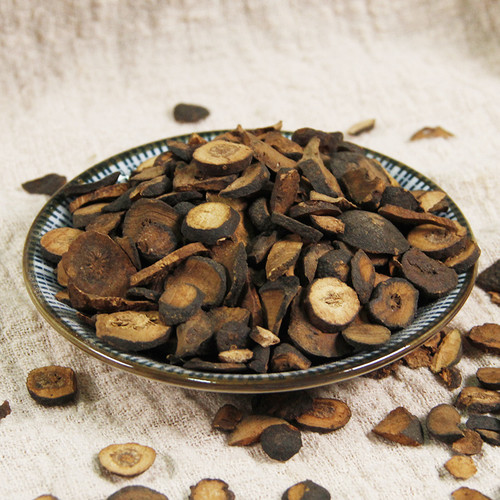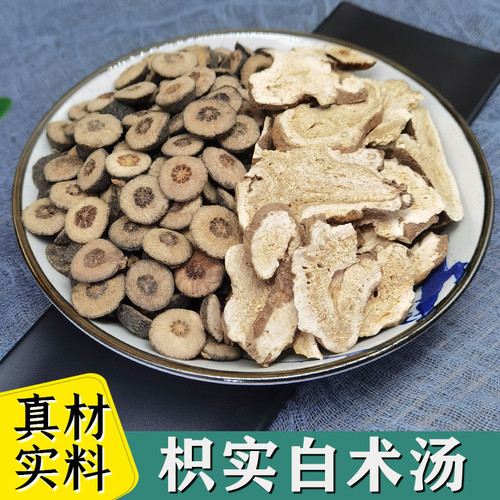Product Overview
Origin
The immature fruit of Citrus aurantium L. or C. sinensis Osbeck. of family Rutaceae.
Location
Sichuan, Jiangxi, Fujian provinces in China.
Harvest
Collected the fell fruit during the period of May to June.
The true smell and taste
Fragrant, slightly sore after bitter when tasted.
Best quality
Green-brownish scarfskin, thick pulp, hard with strong fragrance.
Processing
Sliced and unprocessed or stir-baked with bran.
Property
Pungent, bitter, slightly cold; spleen, stomach and large intestine meridians entered.
Actions
Break qi and relieve stuffiness, resolve phlegm and relieve stagnation.
Indications
A. Syndrome of qi stagnation in stomach and spleen
It is the essential herb for breaking qi and relieving stuffiness, for it has strong actions of promoting flow of middle energizer qi, and can break qi and dissipate nodulation, relieve stuffiness and fullness. For all kinds of qi stagnation syndrome manifested as gastric and abdominal stuffiness and fullness, it can be used in combination. For gastric and abdominal distending pain due to food stagnation, it is usually combined with the digestant herbs. For instance it is combined with Shan Zha, Mai Ya and Lai Fu Zi in Zhi Shi San from Zheng Yin Mai Zhi. For gastric and abdominal stuffiness, fullness and distension after meal due defeciency of spleen-stomach, it should be combined with the qi-tonifying and spleen-invigorating herbs. For instance it is combined with Bai Zhu in Zhi Zhu Wan from Nei Wai Shang Bian Huo Lun. For constipation, gastric and abdominal stuffiness, fullness and distending pain due to heat retention, it is usually combined with the heat-clearing and purgative herbs. For instance it is combined with Da Huang and Mang Xiao in Da Cheng Qi Tang from Shang Han Lun. For abdominal stuffiness and fullness, difficulty in defecation, diarrhea c dysentery with tenesmus due to damp-heat retention, it is usually combined with the heat clearing and damp-removing herbs. For instance it is combined with Huang Lian and Da Huang in Zhi Shi Dao Zhi Wan from Nei Wai Shang Bia Huo Lun.
B. Chest impediment, cough with profuse sputum, stuffiness and distension in chest
It is good at resolving phlegm and removing stagnation, breaking stagnant qi and unblocking stuffiness. For chest impediment due to accumulation of phlegm-turbidity, deficiency of chest-yang and qi stagnation in chest, it is usually combined with the yang-warming, phlegm-turbidity-resolving and chest-soothing herbs. For instance it is combined with Xie Bai, Gui Zhi and Gua Lou in Zhi Shi Xie Bai Gui Zhi Tang from Jin Kui Yao Lue. For stuffiness, fullness and pain in chest and stomach due to syndrome of thoracic accumulation of phlegm-heat, it is usually combined with the heat-clearing and phlegm-resolving herbs. For instance it is combined with Huang Lian, Gua Lou, Ban Xia in Xiao Xian Xiong Tang from Wen Bing Tiao Bian. For chest pain and stuffiness, and cough with profuse sputum, it is usually combined with the damp-drying and phlegm-resolving herbs, and qi-moving and nodulation-dissipating herbs. For instance it is combined with Ban Xia, Tian Nan Xing and Chen Pi in Dao Tan Tang from Jiao Zhu Fu Ren Liang Fang.
In addition, for gastroptosis, gastrectasis, prolapse of rectum and uterus, it also can be used with the qi-tonifying and yang-raising herbs such as Huang Qi, Ren Shen, Sheng Ma and Chai Hu.
Dosage and Administrations
Decoct 3~10 g. The largest dosage is 30 g. Its actions become mild after stir-baked.
Cautions
It should be used with cautions for pregnant women.






